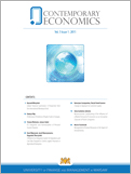Central Bank Independence and Democracy: Does Transparency Matter?
Central Bank Independence and Democracy: Does Transparency Matter?
Author(s): Asmaa Mohamed Ezzat, Mona Esam FayedSubject(s): Political economy, Law on Economics, Financial Markets, Public Finances, Fiscal Politics / Budgeting, Corruption - Transparency - Anti-Corruption
Published by: Akademia Ekonomiczno-Humanistyczna w Warszawie
Keywords: Central Bank Independence; Transparency; Democracy;
Summary/Abstract: Securing central bank independence (CBI) is considered a vital and common practice in a large number of countries, since this independence is often associated with favorable economic performance, and it isolates monetary policy from the distortions of political business cycles, associated with electoral business or partisan cycles. However, one criticism against CBI is the seemed contradiction between independence and democracy, known as the problem of accountability of the monetary authority. Thus, this study empirically examines the potential effects of central bank transparency and independence on democracy. This would, in turn, attribute to reconciling the presumed contradiction between CBI and democracy, besides disentangling the impact of independence and transparency on democracy. To this end, we regress democracy on both CBI and CB transparency, besides some control variables, for a sample of 100 central banks in year 2010. The preliminary results indicate that CBI is conducive to democracy. However, this relationship is dependent on the level of CB transparency, where high levels of transparency could reverse this positive relation and make CBI an obstacle in face of democracy. Furthermore, CB’s transparency is always associated with more democracy, but increasing the level of CBI reduces this positive impact.
Journal: Contemporary Economics
- Issue Year: 14/2020
- Issue No: 2
- Page Range: 90-111
- Page Count: 22
- Language: English

